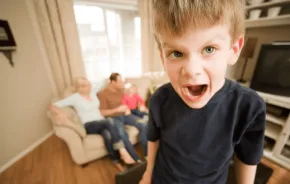 You know when February rolls around because the aisles of the local shopping venues turn various shades of pink and red. Roses and hearts. Here comes Valentine’s Day to celebrate love and connection. When we picture the young adults our children might become, we dream of people who have healthy connections, people in their lives they love and who love them, and of course a loving connection with their family.
You know when February rolls around because the aisles of the local shopping venues turn various shades of pink and red. Roses and hearts. Here comes Valentine’s Day to celebrate love and connection. When we picture the young adults our children might become, we dream of people who have healthy connections, people in their lives they love and who love them, and of course a loving connection with their family.
But real life in our homes doesn’t always look so “loving.” As a parenting educator I know that one of the things that bugs parents most is their children’s constant bids for attention, which sometimes take the form of whining, grabbing, hitting, or other sorts of creative mischief. Honestly, not all our responses to these gambits would fit under the category of “loving.” These childhood tactics appear most when our “best parenting selves” are not very available: when we are in a hurry, busy with cooking, finishing an important piece of work at home or just plain want some quiet time for ourselves.
Attention or connection?
Kent Hoffman of Circle of Security has a helpful way of understanding this phenomenon. He notes that kids settle for attention — but what they are really seeking is connection. Of course! We all long for the feeling that we are connected — that we belong and that we matter. When children (out of awareness) get the sense that they are no longer in that great big web of belonging — when we are busy being busy, when we are in a hurry — then they make a ploy for the closest substitute for connection that they know: attention.
My own first response hearing this was to acknowledge that it made sense, followed by a feeling of panic. I simply can’t connect all of the time, I thought. I need some of my time for me and for taking care of my other responsibilities. Turns out it wasn’t that hard to make a shift. Kids don’t need connection all the time. They just often need it first.
As a family physician I would often come home from the office quite depleted, already having reviewed the list of things that “needed doing” as I drove home: make dinner, offer homework help, get everyone to bed. You know the drill. I tended to arrive home already overwhelmed by the tasks before me and in “press on, regardless” mode. My kids of course were all over me. That made preparing dinner a frustrating and challenging task. “Quality time?” Yeah right.
When I shifted to the realization that my kids hadn’t seen me all day and what they really wanted was connection I tried an experiment. I tried connecting first. That meant coming home, having light snacks for everyone and then snuggling together, reading or (our favorite) playing love trap monster on the floor. Physical contact. Love. Connection. Ten to 15 minutes.
Then when I went to cook dinner, I either had peace or very cooperative helpers. What a difference! In that more peaceful space, I noticed that I had needed connection too. We all felt better.
What can you do to build connection?
Connection is not the same thing as attention. See attention-getting behavior as a bid for connection. Sometimes a hug or empathy is all that is needed.
Make time for connection inside your normal routines. This sometimes means getting up ten minutes earlier so you can sit with your children at breakfast or snuggle a bit before school. It might mean changing the order of things a bit. Experiment.
Take time to listen. Actually, take time to hear. Who is the person behind that behavior?
You are teaching by modeling. Make connection with your partner a priority too. It isn’t just our connection with our children that matters. Your connection with your partner and how you treat your friends is being carefully stored in your children’s embodied memory banks.
 About the author
About the author
Jody McVittie, MD is the executive director and cofounder of Sound Discipline, a local non-profit dedicated to teaching people to do the right thing, even when no one is looking. Sound Discipline works with schools and families in the Puget Sound Community.
Jody has been working with families since she got frustrated with her own family at the ripe age of 3. Needless to say her skills have improved a little since then. She is now a much in demand speaker to help families deal with the kind of know-it-all demanding 3- (and 13-) year-old she once was. And, as her children (now young adults) remind her, she was far from a perfect parent. She is grateful for what she continues to learn from them.









